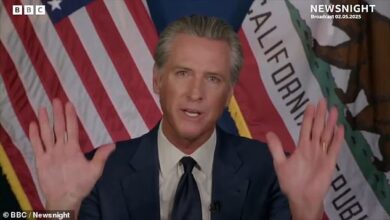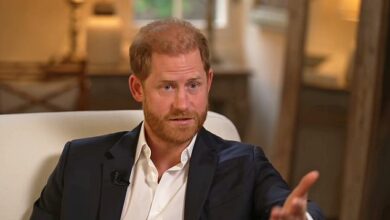Prince Harry is accused of ‘bragging and encouraging illegal drug use’ in his memoir Spare in US court papers filed by the Heritage Foundation
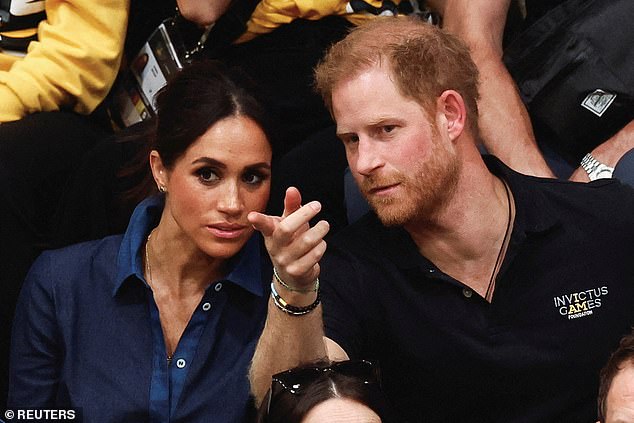
Prince Harry has been accused of ‘bragging and encouraging illegal drug use’ in his memoir Spare, according to a new court filing.
The Heritage Foundation is suing the Biden administration in a bid to force officials to release the Duke of Sussex’s US immigration files to see if he admitted to using illegal drugs before gaining a visa.
In Spare, the 39-year-old admitted to using marijuana, cocaine and magic mushrooms, saying ‘Psychedelics did me some good’. He also experimented with the hallucinogenic Amazonian plant ayahuasca, describing it as ‘the cleaning of the windshield, the removal of life’s filters’.
Harry’s admissions prompted the conservative think-tank to sue the Department of Homeland Security (DHS) under the Freedom of Information Act, claiming the royal may have been given favorable treatment when he applied for a US visa.
The Biden administration is fighting the case on the basis that visa applicants have a right to privacy. But the foundation has countered by insisting Harry undermined his right to privacy in the book and by ‘selling every aspect of his private life’.

The Heritage Foundation are asking to view the Duke of Sussex’s US immigration files to see if he admitted to using illegal drugs before gaining a visa. Harry is seen with Meghan at the Invictus Games

Harry – seen leaving a London nightclub in 2006 – has openly admitted to taking illegal drugs
In its latest legal filing at the Federal Court in the District of Columbia, seen by Newsweek, the Heritage Foundation states: ‘[The case] comes about in the main because HRH [His Royal Highness] voluntarily – and for immense profit – admitted in writing to the elements of any number of controlled substance violations. (Indeed, some say HRH has approached the point of bragging and encouraging illegal drug use.)
‘The Duke of Sussex did so despite the fact that it is widely known that such admissions can have adverse immigration consequences for non-citizens and despite employing preeminent legal advisors on both sides of the Atlantic,’ the document added.
‘But that is not all. This case is further bespoke in that HRH – again for immense profit – detailed his immigration decisions and manner of entry in writing and via Netflix video.
‘Add to that the fact that all aspects of HRH’s travel are extensively covered in the press.’
Harry had no qualms when it came to sharing private information in his memoir Spare – in which he even includes an anecdote about his frostbitten penis – as well as his six-part Netflix series with wife Meghan Markle late last year.
In its filing, the foundation notes that the duke’s attempts to claim ‘privacy interests’ despite these disclosures had led to ‘public ridicule’.
‘The Duke of Sussex has sold every aspect of his private life for, in some estimates, over $135 million. HRH’s [His Royal Highness’] claims of privacy interests in the face of this conduct have been met with widespread public ridicule,’ its filing states
‘The Duke of Sussex must take the good with the bad. Having sold all manner of private matters for profit – including specific details on his taking up residence in the United States and every detail of his years of illegal drug use to the point of braggadocio – HRH must accept a substantially diminished privacy interest,’ the filing adds.
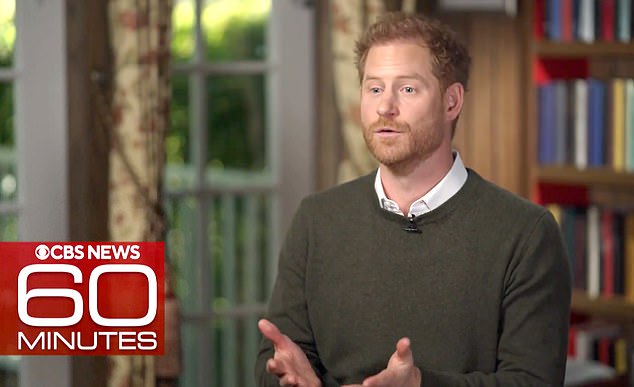
The Duke of Sussex openly discussed how he experimented with drugs in his youth, including cocaine, magic mushrooms, and marijuana, in his new memoir and in interviews after his memoir was released

He also shared personal information about his life on his Netflix show alongside wife Meghan Markle
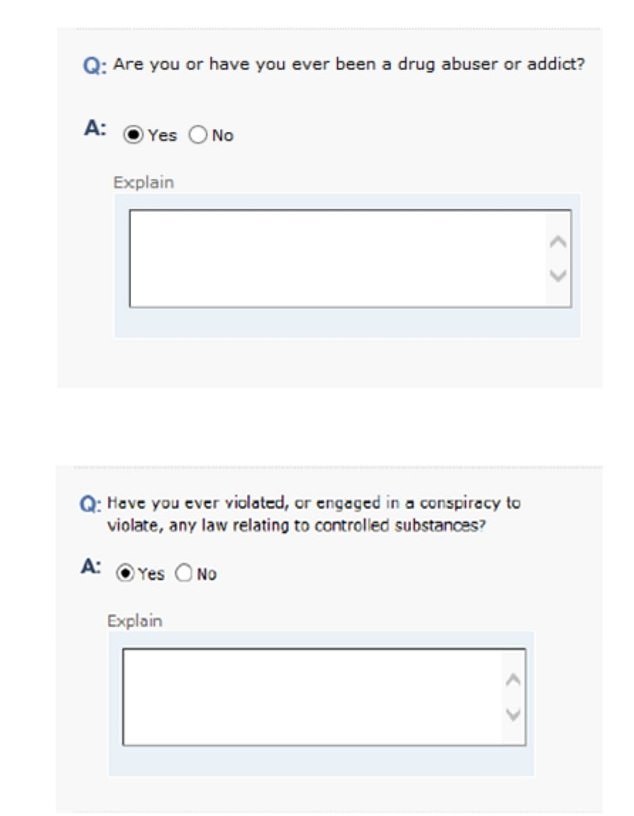
This is the section of the visa application that Prince Harry would have had to fill out in order to get into the United States
Heritage has claimed Harry could have lied about taking drugs in his immigration paperwork despite admitting doing them in his memoir and in the Netflix show.
If the prince did not tell the truth on his entry forms then he could be removed from the US or barred by a border agent.
DHS initially rejected the application and the Heritage Foundation filed a lawsuit in a court in Washington after its administrative appeal stalled.
Both sides were asked by a judge to try to work out differences on key points, but after that failed DHS filed a request for summary judgment, or to dismiss the case.
In a legal filing that emerged in August, DHS claimed that disclosures Harry made in his memoir and TV series did not mean it should have to hand the documents over.
Jarrod Panter, Acting Associate Center Director for Freedom of Information at DHS, wrote: ‘Prince Harry has not consented to the release of records related to or reflecting information about him.
‘Despite the public role that Prince Harry has played in the UK and despite information that he has disclosed regarding his personal life, he still maintains a strong privacy interest in his immigration status and information about him reflected in (immigration) records.
‘Prince Harry has not publicly or officially disclosed his status in the United States and has not surrendered all rights to personal privacy.’
In his memoir, Spare, which came out in January, and the Netflix show Harry & Meghan, Harry was frank about his past drug use.
He has admitted to using cocaine and marijuana, once saying that cannabis helped heal the trauma of his mother’s death.
The Duke said that through using ayahuasca, the psychedelic drug, he realized that his mother wanted him to be ‘happy’.
Despite this, Harry’s US visa application in March 2020 could show he ticked the ‘no’ box on questions about his drug use, The Heritage Foundation claims.
In its legal filing, DHS said that the records at issue are ‘particularly sensitive’ because they would ‘reveal Harry’s (immigration) status in the United States’.
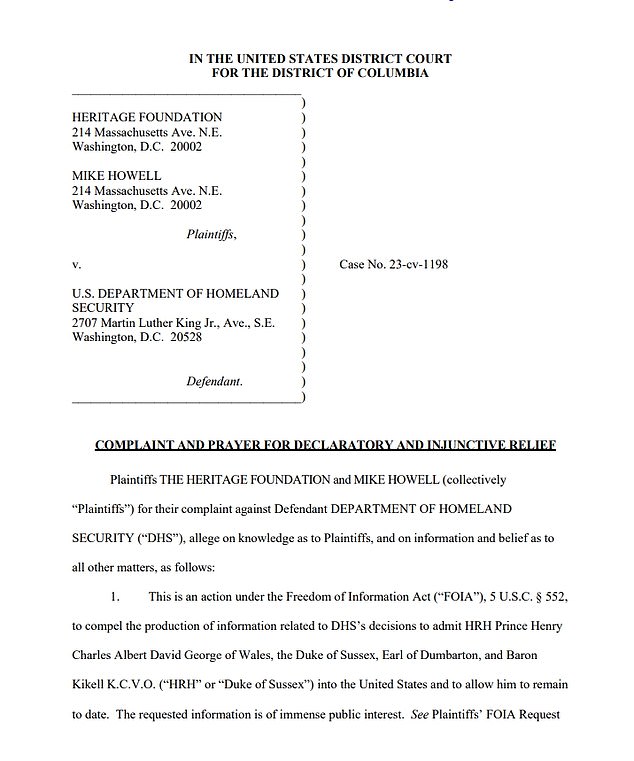
The Heritage Foundation, a right-wing think tank, filed a complaint and request for injunctive relief in May after their FOIA request was denied
DHS wrote: ‘Even though he is a public figure, Prince Harry still maintains a privacy interest in these types of records and in his immigration or visa status generally.
‘Even if public figures may have a diminished expectation of privacy, they do not surrender their privacy interests entirely’,
The filing added that ‘were this not the case, a requester could go on a fishing expedition for (government) records for any celebrity at all’.
The original request sought to reveal whether Harry, who moved to the US after quitting being a working member of the British royal family, was getting ‘preferential treatment’.
But the Heritage Foundation has merely ‘recounted a litany of allegedly suspicious circumstances (that) lacked any substantiation’, DHS said.
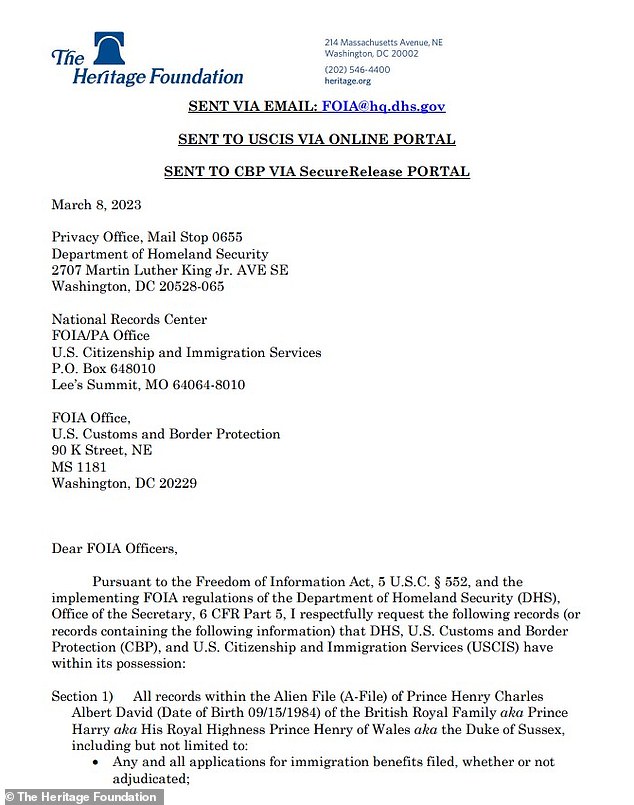
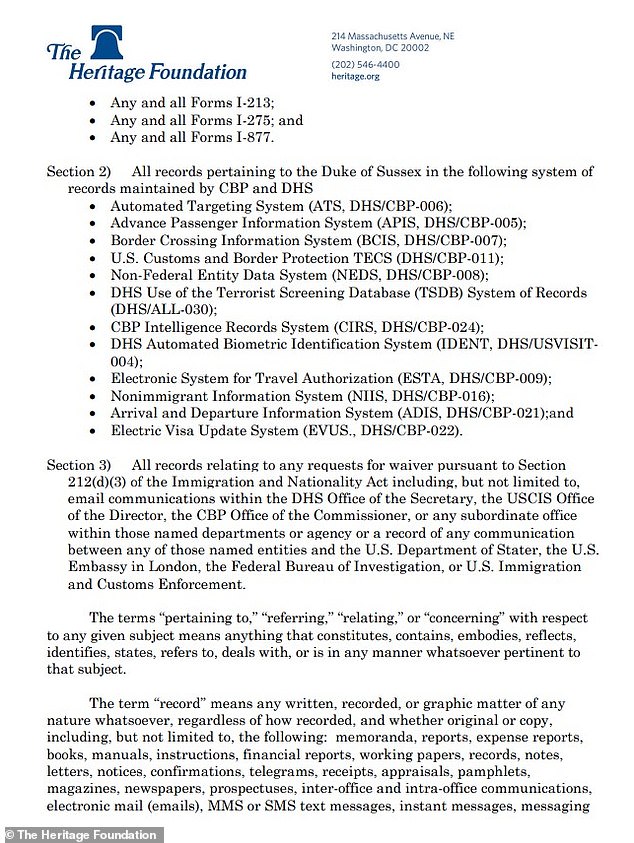
The Heritage Foundation had requested access to Prince Harry’s records from DHS through the Freedom of Information Act earlier this year
DHS dismissed the Heritage Foundation’s claims as a ‘bare suspicion of government misconduct’ and making Harry’s paperwork public would not shed any ‘meaningful light’ on how it operates.
Earlier this year Rep. Greg Steube introduced the SPARE Act which would lead to deportation for non-citizens who are found to lie about drug use on their visa application.
The act would require the Homeland Security secretary to begin an investigation within 60 days if information came to light about a non-citizen’s drug use.
Harry has previously declined to comment on the case.


